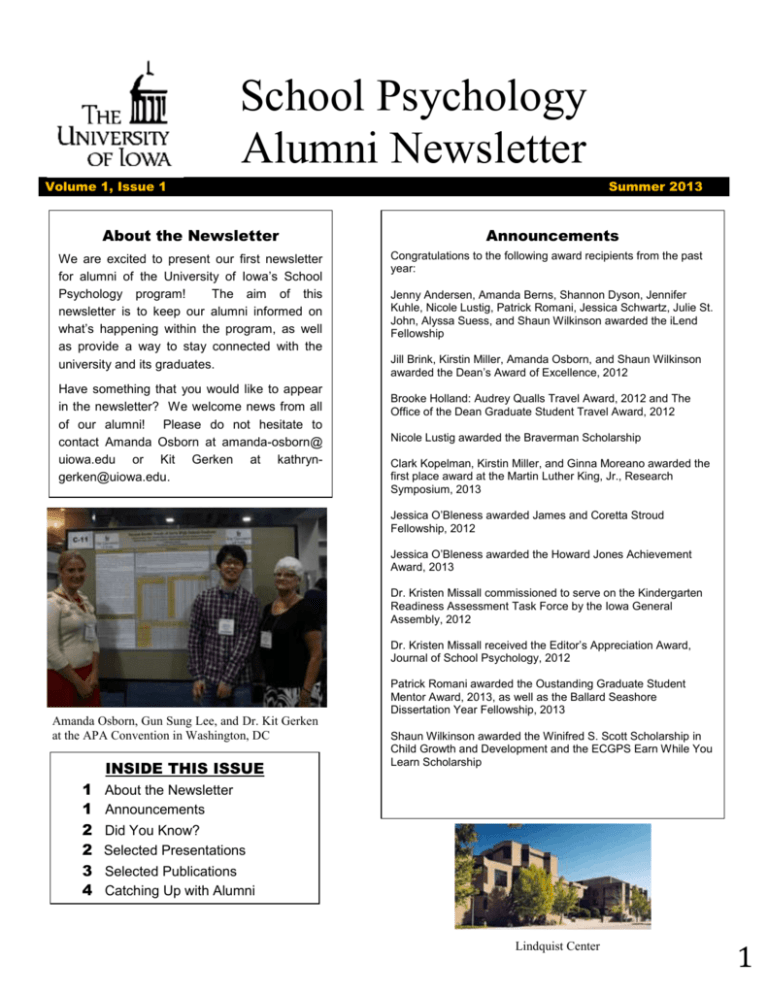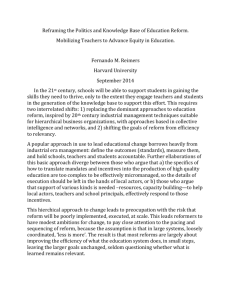Summer 2013 - University of Iowa
advertisement

School Psychology Alumni Newsletter Volume 1, Issue 1 About the Newsletter We are excited to present our first newsletter for alumni of the University of Iowa’s School Psychology program! The aim of this newsletter is to keep our alumni informed on what’s happening within the program, as well as provide a way to stay connected with the university and its graduates. Have something that you would like to appear in the newsletter? We welcome news from all of our alumni! Please do not hesitate to contact Amanda Osborn at amanda-osborn@ uiowa.edu or Kit Gerken at kathryngerken@uiowa.edu. Summer 2013 Announcements Congratulations to the following award recipients from the past year: Jenny Andersen, Amanda Berns, Shannon Dyson, Jennifer Kuhle, Nicole Lustig, Patrick Romani, Jessica Schwartz, Julie St. John, Alyssa Suess, and Shaun Wilkinson awarded the iLend Fellowship Jill Brink, Kirstin Miller, Amanda Osborn, and Shaun Wilkinson awarded the Dean’s Award of Excellence, 2012 Brooke Holland: Audrey Qualls Travel Award, 2012 and The Office of the Dean Graduate Student Travel Award, 2012 Nicole Lustig awarded the Braverman Scholarship Clark Kopelman, Kirstin Miller, and Ginna Moreano awarded the first place award at the Martin Luther King, Jr., Research Symposium, 2013 Jessica O’Bleness awarded James and Coretta Stroud Fellowship, 2012 Jessica O’Bleness awarded the Howard Jones Achievement Award, 2013 Dr. Kristen Missall commissioned to serve on the Kindergarten Readiness Assessment Task Force by the Iowa General Assembly, 2012 Dr. Kristen Missall received the Editor’s Appreciation Award, Journal of School Psychology, 2012 Patrick Romani awarded the Oustanding Graduate Student Mentor Award, 2013, as well as the Ballard Seashore Dissertation Year Fellowship, 2013 Amanda Osborn, Gun Sung Lee, and Dr. Kit Gerken at the APA Convention in Washington, DC INSIDE THIS ISSUE 1 1 2 2 3 4 Shaun Wilkinson awarded the Winifred S. Scott Scholarship in Child Growth and Development and the ECGPS Earn While You Learn Scholarship About the Newsletter Announcements Did You Know? Selected Presentations Selected Publications Catching Up with Alumni Lindquist Center 1 School Psychology Alumni Newsletter Did You Know? Our students and faculty lead some interesting lives… Nicole Lustig recently completed an Ironman competition. Amanda Osborn breeds sheep as a hobby. Jen Kuhle teaches French to children. Dr. Kit Gerken has a black belt in Tae Kwon Do. Selected Presentations Holland, B.M., Cooper-Brown, L.J., & Bachmeyer, M.H. (2012, May). Outcomes of an intensive outpatient behavioral feeding program at the University of Iowa. Presented at the annual meeting for Association for Behavior Analysis, Denver, CO. Holland, B.M., Schieltz, K.M., Wacker, D.P., & Suess, A.N. (2012, May). Effects of reinforcers identified in a concurrent operants on low preferred activities in an outpatient clinic. Poster presented at the annual conference of the Association for Behavior Analysis International, Seattle, WA. Kopelman, A. R., Miller, K. D., Moreano, G., & Santos, A. (2013, February). Promoting School Engagement of Migrant Students Through Summer School Participation. Poster presentation at the National Association of School Psychologists Annual Convention, Seattle, WA. Selected Presentations Holland, B.M., Cooper-Brown, L.J., & Bachmeyer, M.H. (2012, May). Outcomes of an intensive outpatient behavioral feeding program at the University of Iowa. Presented at the annual meeting for Association for Behavior Analysis, Denver, CO. Holland, B.M., Schieltz, K.M., Wacker, D.P., & Suess, A.N. (2012, May). Effects of reinforcers identified in a concurrent operants on low preferred activities in an outpatient clinic. Poster presented at the annual conference of the Association for Behavior Analysis International, Seattle, WA. Kopelman, C., Jones, G., Kramer, A. R.., Knabe, W., & Ehly, S. (2012, May). The relationship between parental involvement and adolescent drug use. Poster session presented at the 84th annual meeting of the Midwestern Psychological Association, Chicago, IL. Holland, B.M., Cooper-Brown, L.J., & Bachmeyer, M.H. (2012, May). Outcomes of an intensive outpatient behavioral feeding program at the University of Iowa. Presented at the annual meeting for Association for Behavior Analysis, Denver, CO. Holland, B.M., Schieltz, K.M., Wacker, D.P., & Suess, A.N. (2012, May). Effects of reinforcers identified in a concurrent operants on low preferred activities in an outpatient clinic. Poster presented at the annual conference of the Association for Behavior Analysis International, Seattle, WA. Kopelman, C., Jones, G., Kramer, A. R.., Knabe, W., & Ehly, S. (2012, May). The relationship between parental involvement and adolescent drug use. Poster session presented at the 84th annual meeting of the Midwestern Psychological Association, Chicago, IL. Kopelman, C., Jones, G., Kramer, A. R.., Knabe, W., & Ehly, S. (2012, May). The relationship between parental involvement and adolescent drug use. Poster session presented at the 84th annual meeting of the Midwestern Psychological Association, Chicago, IL. Kopelman, C., Marron, M., & Assouline, S. (2012, December). The social, emotional, and academic characteristics of profoundly gifted students receiving specialized services. Poster session presented at the 59th annual convention of the National Association of Gifted Children, Denver, CO. Missall, K., Wilkinson, S., Gethmann, D., & Johnson, K. (2012). A Statewide Effort to Identify and Evaluate PreK Assessments for Screening and Monitoring Progress in Early Literacy. Poster presented at the RTI Early Childhood Summit, Santa Ana Pueblo, NM. Romani, P. W., Wacker, D.P., Kane, A.N., Suess, A.B., Holland, B.M., Padilla-Dalmau, Y.C, & Schwartz, J.E. (2013, May). Relations between preference and the persistence of task completion. In W. Berg (Chair). Presentation presented at the 39th annual convention of the Association for Behavior Analysis International, Minneapolis, MN. Suess, A.N., Wacker, D.P., Kopelman, T.G., Lindgren, S.D., Lee, J.F., Romani, P., & Dyson, S. (2013, May). Assessment of challenging behavior by parents via in-home telehealth assessment of challenging behavior by parents via in-home telehealth. Presentation presented at the 39th annual convention of the Association for Behavior Analysis International, Minneapolis, MN Yang, L.-Y., Piazza, C., Milnes, S. M., Kozisek, J. M., Volkert, V. M., & Van Riper, C. (2013, May). Producing clinically meaningful outcomes for children with autism spectrum disorders and feeding disorders. Symposium presented at the 39th Annual Convention of Association for Behavior Analysis International, Minneapolis, MN. 2 School Psychology Alumni Newsletter Selected Publications Selected Publications Hojnoski, R. L., & Missall, K. N. (2010). Social development in preschool classrooms: Promoting engagement, competence, and school readiness. In M. R. Shinn and H. M. Walker (Eds.), Interventions for achievement and behavior in a three-tier model including RTI (pp. 703-728). Bethesda, MD: National Association of School Psychologists. Suess, A. N., Romani, P. W., Wacker, D. P., Lee, J. F., Dyson, S. M., Kuhle, J. L., Lindgren, S. D., Kopleman, T. G., Pelzel, K. E., & Waldron, D. B (accepted pending revisions). Evaluating the treatment integrity of parents who conduct inhome functional analyses and treatment of problem behavior of young children with autism via teleconsultation. Journal of Behavioral Education. Kopelman, C. & Kramer, A. (2012). Expanding doors to service for LGBT youth. The Iowa Psychologist, 12-13. Retrieved from http://iowapsychology.org/files/TIP%20Spring%202012%2 FINAL.pdf Roseth, C. J., Missall, K. N., & McConnell, S. R. (accepted). Early Literacy Individual Growth and Development Indicators (EL-IGDIs): Growth trajectories using a large, internet-based sample. Journal of School Psychology. Kopelman, C. (2011). Letting research inform practice. The Iowa Psychologist, 56(4), 3. Retrieved from http://iowapsychology.org/files/TIP-Winter-2011.pdf Missall, K. N. & McConnell, S. R. (2010). Early literacy and language IGDIs for preschool-aged children. In J. J. Carta and C.Greenwood (Eds.), Individual Growth and Development Indicators: Tools for monitoring progress and measuring growth in very young children (pp. 181-201). Baltimore, MD: Brookes. Missall, K. N., Mercer, S. H., Martinez, R. S. & Casebeer, D. (2012). Concurrent and longitudinal patterns and trends in performance on early numeracy curriculum-based measures in kindergarten through third grade. Assessment for Effective Intervention, 37(2), 95-106. Wacker, D. P., Berg, W. K., Schieltz, K. M., Romani, P. W., & Padilla Dalmau, Y. C. (2012). Outpatient units. In D. D. Reed, F. D. Reed, & J. L. Luiselli (Eds.), Handbook of crisis intervention for individuals with developmental disabilities. New York, NY: Springer. Wacker, D.P., Lee, J.F., Padilla Dalmau, Y.C., Kopelman, T.G., Lindgren, S.D., Kuhle, J.L., Pelzel, K.E., Dyson, S., Schieltz, K.M., & Waldron, D.B. (in press). Conducting functional communication training via telehealth to reduce problem behavior of young children with autism, Journal of Physical and Developmental Disabilities. Yang, L.-Y., Guo, J.-P., Richman, L.C., Schmidt, F.L., Gerken, K.C., & Ding, Y. (2013). Visual skills and Chinese reading acquisition: A meta-analysis of correlation evidence. Educational Psychology Review (SSCI). 25 (1), 115-143. Missall, K., & O’Bleness, J. (2013). Quality of life in early childhood. In A. C. Michalos (Ed.), Encyclopedia of quality of life research. Heidelberg, Germany: Springer. O’Bleness, J. & Missall, K. (2013). Attachment theory and classroom management. To appear in W.G. Scarlett (Ed.).Classroom management: An A-to-Z guide. Thousand Oaks, CA: Sage Publishing Osborn, A. (2012). Juggling personal life and professionalism: Ethical implications for rural school psychologists. Psychology in the Schools, 49 (9), 876-882. Padilla Dalmau, Y. C., Wacker, D. P., Harding, J. W., Berg, W. K., Schieltz, K. M., Lee, J. F., Breznican, B. P., & Kramer, A. R. (2011). A preliminary evaluation of functional communication training effectiveness and language preference when English and Spanish are manipulated. Journal of Behavioral Education, 20, 233-251. Gun Sung Lee, Alyssa Suess, Kirstin Miller, and Shaun Wilkinson in Philadelphia for the NASP Convention Romani, P.W., Ringdahl, J.E., Vinquist, K.M., Dutt, A., Suess, A.N., Whittington, H., & Kopelman, C. (in press). An evaluation of prompt density, rate of reinforcement, and the persistence of manding. The Psychological Record. Anna Ing, Brooke Holland, Jessica Schwartz, Alyssa Seuss, Michael Scheib, Nicole Lustig, Yaniz Padilla Dalmau, and Patrick Romani at a Seattle Mariners game, before the ABAI Conferece 3 School Psychology Alumni Newsletter Catching Up With Alumni Thomas Reimers, PhD Director of Behavioral Health Clinic At Boys Town in Nebraska Dr. Reimers is an Iowa graduate who has accomplished quite a lot in his career. While a doctoral student in the School Psychology program at the University of Iowa, Dr. Reimers worked extensively in the behavioral clinics at the University of Iowa Hospitals and Clinics. He received post-doctoral training in the Kennedy Institute at The Johns Hopkins School of Medicine. Dr. Reimers created a new program and worked for 17 years in The Family Support Center at Children’s Hospital in Omaha, before becoming the director of the Behavioral Health Clinic at Boys Town. During his time as director, Dr. Reimers has expanded the services of the clinic, which sees about 20,000 children each year. Dr. Reimers’ career has included clinical work and research, and he published many works in professional journals, as well as the public arena. Dr. Reimers credits the School Psychology program with providing him the opportunities to develop the skills that has led him to be a successful clinician and researcher. He believes the ability to work in the schools and the clinics at UIHC are a great asset to the program, as students can gain valuable experiences in a range of settings. As Dr. Reimers put it, the program is the “best of both worlds” for school assessment and intervention, as well as clinic experiences. Working in the clinics at UIHC also provided Dr. Reimers with the opportunity to engage in research as well as clinical practice. Dr. Reimers was especially influenced by his mentor at UIHC, Dr. David Wacker, and recalls working with Dr. Wacker as an important contribution to his doctoral training. Furthermore, Dr. Reimers expressed his gratitude to the School Psychology program, especially Dr. Stewart Ehly, for preparing him for his career as a researcher and clinician. Overall, he believes that these opportunities have opened many doors for him, such as providing him with the training that allowed him to obtain an internship at Johns Hopkins. When asked to provide advice for current students of the program, Dr. Reimers encouraged students to start thinking about one’s personal objective right away, and to take advantage of the many opportunities that the university has to offer in order to achieve this objective. Students should talk to people doing what they want to do, so that they can get more information and obtain the proper training. Dr. Reimers also believes that students should spend a lot of time in the classroom and in the field learning new things. This provides the opportunity to get experiences early and find the things that interest you, as well as the things that you don’t enjoy. As Dr. Reimers puts it, many students and interns think they want to do something, until they start doing it and realize it isn’t exactly what they thought it would be. Furthermore, you may not find out what you want to do until you start doing it. Dr. Reimers extends this advice to program graduates just starting out in this career. Practitioners should continue to reach out and actively seek the opportunities they need to be successful professionals. Get engaged in organization at the community, local, and national levels. Take advantage of any connections that you may have. If you are not happy with your situation, think about ways that you can create the opportunities you wish to seek. Based on his own accomplishments, Dr. Reimers is definitely an example of the power of this advice. Written by Amanda Osborn 4 School Psychology Alumni Newsletter Catching Up With Alumni Mary Stevens, PhD Director of Special Education Area Education Agency 267 “Stick with it; you’re going to love it.” That’s Dr. Steven’s advice for students in the school psychology program. She stated the school psychology is an interesting and rewarding field. In terms of training advice, Dr. Stevens asserts that students should focus on data-based decision making, including how this relates to the Iowa Core, and response to intervention (RTI). Additionally, students should familiarize themselves with effective instructional strategies Dr. Stevens is an Iowa alumnus who has displayed and functional assessments (both behavioral and great leadership in her career. Dr. Stevens worked academic), so they can lead students to good as a school psychologist from 1977 to 1987, at instruction. which point she became a part time administrator as well. In 1992, Dr. Stevens became a full time Dr. Stevens’ advice for new professionals is to administrator in the schools. In 2003, she became focus on the kids. The most important goal for a psychologist should be to accelerate learning for a regional director for the AEA, and in 2005 promoted to special education director of AEA 267. each child, so that every child can succeed. Dr. Stevens’ work has led her out of state as well, Furthermore, keep in mind that our job is to support to Minnesota and Illinois, before bringing her back teachers and parents. Dr. Stevens emphasized to Iowa. In her current position as director of the importance of parental involvement in student special education, Dr. Stevens provides leadership success; school psychologists need to make an to staff, hires new employees, designates especial effort to collaborate with parents in order employee assignments, allocates resources, and to provide the best services to students. ensures that students with disabilities have their needs met and are provided with free and At the end of the interview, Dr. Stevens stressed her gratitude to the school psychology program at appropriate education. the University of Iowa. She stated that she feels Dr. Stevens stated that she loved the school “blessed” to have had such great opportunities in psychology program at the University of Iowa. She this field, and a lot of those opportunities were stated that Dr. Kit Gerken was a great advisor, and given to her because of the University of Iowa. she was provided a supportive and encouraging She reiterated that her training has helped her not environment to develop her skills. Furthermore, only in her work as a school psychologist, but in she claimed that the program stressed problem- other areas outside the field, particularly with solving and the scientific method of hypothesis respect to administration. It is clear that Dr. testing, which has helped her work with students, Stevens is a credit to the school psychology teachers, and parents in order to select the best program; not only does she exhibit great leadership strategies in the schools. This has also helped as skills, she also demonstrates how a professional her work has moved to more system-wide and can take the training provided in the program to classroom-level interventions, as Dr. Stevens advance to great heights. believes that the same data-based decision making process for individual students is important for administrative decisions. Written by Amanda Osborn 5





